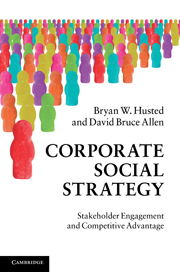Book contents
- Frontmatter
- Contents
- Figures
- Tables
- Acknowledgments
- 1 Introduction
- Part I Fundamentals
- 2 Is corporate social strategy ethical?
- 3 Theory of the firm and corporate social strategy
- 4 How do we build corporate social strategy?
- 5 Elements of successful corporate social strategy
- Part II The process of developing corporate social strategy
- Part III Implementing social strategy
- Bibliography
- Index
2 - Is corporate social strategy ethical?
Published online by Cambridge University Press: 05 June 2012
- Frontmatter
- Contents
- Figures
- Tables
- Acknowledgments
- 1 Introduction
- Part I Fundamentals
- 2 Is corporate social strategy ethical?
- 3 Theory of the firm and corporate social strategy
- 4 How do we build corporate social strategy?
- 5 Elements of successful corporate social strategy
- Part II The process of developing corporate social strategy
- Part III Implementing social strategy
- Bibliography
- Index
Summary
The differential characteristic of corporate social strategy is the objective of pursuing both social value creation and economic value creation through social action projects. Moreover, we go so far as to argue that when social action projects achieve both ends, firms will be encouraged to make additional social investments and that economic value creation is positively correlated with sustainable social action.
We also believe that corporate social strategy and corporate social responsibility are compatible. This belief is by no means shared by many business and society academics. The traditional definition of CSR precludes the pursuit of profit when firms engage in social action projects. This is an important point that should not be obscured by the research of a number of authors arguing that corporate social performance is positively related to business performance (Cochran and Wood, 1984; McGuire et al., 1988; Hosmer, 1994b; Waddock and Graves, 1997; Margolis and Walsh, 2003). This positive relationship is understood as an unintended yet felicitous outcome. All of us with some experience in CSR have heard repeatedly from The Global Compact, Business for Social Responsibility, The Caux Roundtable, the US Chamber of Commerce, etc., that doing good is good business. Who, on the other hand, has sighted a CEO jumping up to declare that the reason to do good is because it is profitable?
- Type
- Chapter
- Information
- Corporate Social StrategyStakeholder Engagement and Competitive Advantage, pp. 29 - 47Publisher: Cambridge University PressPrint publication year: 2010

